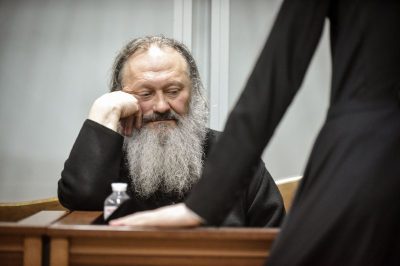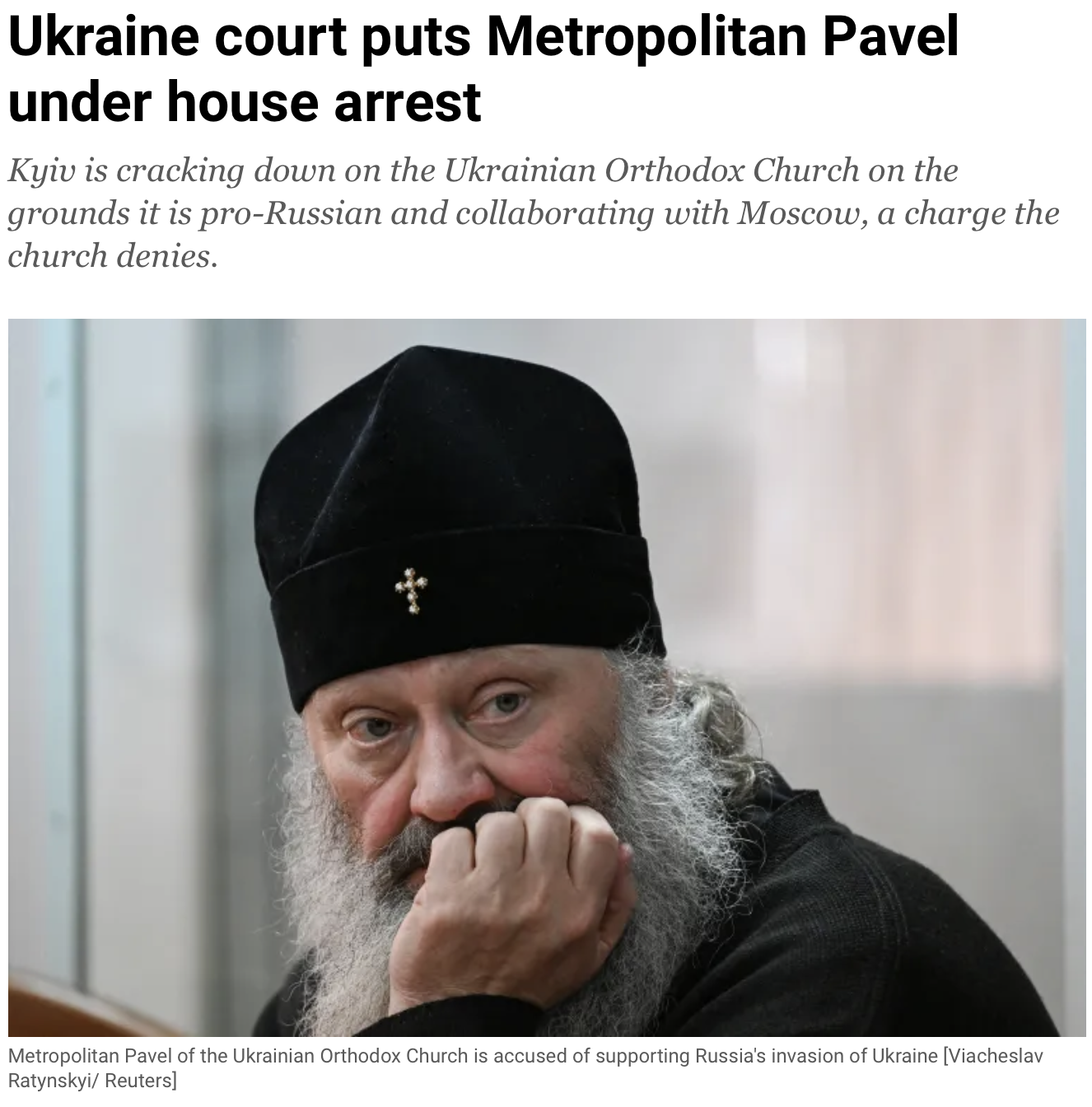Hypocrisy: The Predicament of Metropolitan Pavel, Distinguished Ecclesiastic Figure in Ukraine

All Global Research articles can be read in 51 languages by activating the Translate Website button below the author’s name.
To receive Global Research’s Daily Newsletter (selected articles), click here.
Click the share button above to email/forward this article to your friends and colleagues. Follow us on Instagram and Twitter and subscribe to our Telegram Channel. Feel free to repost and share widely Global Research articles.
***
“Hypocrite” is a concept that is much overworked but lately it has gained a new freshness thanks to the serene indifference of the collective West to the trampling of its most cherished values whenever those it does not favour are affected. It happens, oddly enough, that in the Iranian political lexicon the word “hypocrite” is a favourite expression when referring to Western governments. In Farsi, for all we know, that word may serve as some sort of derogatory epithet with many interesting, culturally conditioned layers. But whatever the subtleties in Farsi, in relation to much of the current public behaviour in the West the English-language equivalent fits the bill perfectly.
New developments make it imperative to refocus attention on the predicament of Metropolitan Pavel, a distinguished ecclesiastical figure in Ukraine, a prince, so to speak, of that country’s Orthodox Church and abbot of its most important religious sanctuary, the Kiev Caves Monastery.
The persecution he has meekly endured has caused not even a ripple in the “city on a hill”, aka the fabled collective West, the promised land of “values” where advocacy of human rights, respect for dignity, and most importantly freedom of belief, are said to be bedrock principles.
Just a few days ago, after being forcibly ejected from the premises of the Kiev Caves Monastery, which on behalf of the canonical Ukrainian Orthodox Church he is charged with supervising and administering, and after spending two months under house arrest at a different location with a humiliating ankle bracelet like a common criminal, the Metropolitan was finally given the semblance of a hearing. He was arraigned on charges that had never been made very clear since the proceedings against him were started, but which vaguely revolve around allegations of provoking religious discord and insinuations of sympathy for Russia.
On 13 July, when he was transferred from home detention in a village near Kiev to a pre-trial detention facility, the Metropolitan’s position deteriorated significantly once he was subjected to a harsh prison regime. His contact with the outside world is now greatly reduced and there is no guarantee that his serious diabetic condition would be medically attended in any meaningful sense. In prison, he is awaiting the filing of further criminal charges that were recently announced by the authorities. In cynical emulation of their Western overlords’ judicial practice, pending trial the Ukrainian judges have generously consented to set bail for the Metropolitan’s provisional release. The amount was fixed at the modest sum of 33 million hryvnias, or nearly $900,000 which, naturally, the prisoner does not have. It is uncertain whether in all of Ukraine there is a bail bond agency or pious oligarch prepared and bold enough to front this amount of cash for a man so deeply in disgrace with the country’s democratic government and its equally irreproachable institutions.
Technically however, and is that not all that counts, all the bases have been covered. In the exemplary rule-of-law democracy that is Ukraine, the presumption of innocence obviously must be fully in effect and the theoretical possibility of mounting a defence while outside prison bars has admirably been affirmed. As in the advanced democracies that stand with Ukraine and serve as its model, until the legal process runs its course there is no necessity for an unconvicted suspect to languish in prison. There is just one catch. It is that notwithstanding the laudable desire to emulate advanced foreign models, Ukrainian judges probably were not properly briefed on what the Eighth Amendment actually holds. It prohibits excessive bail, defined as an imposition disproportionate to the prisoner’s means, and it further mandates that the bail amount be set in relation to evidence of whether or not the prisoner poses a flight risk. It contains also some bizarre language prohibiting “cruel and unusual punishment.” But that should hardly impress officials of a government whose armed thugs routinely and with impunity kneecap war prisoners as well as commit a raft of other unspeakable atrocities, while making video recordings of it for their own entertainment.
Metropolitan Pavel is unlikely to have squirreled under his mattress nearly a million dollars he needs to post bail, never mind the preposterous notion that a man who had to be dragged by the police out of his Kiev Caves monastery refuge should now suddenly be regarded as a flight risk. So it is the faithful of the Ukrainian Orthodox Church who are currently collecting hryvnias on his behalf, in the prayerful hope of at least securing their ailing hierarch’s temporary release.
All this poignantly recalls St. Paul’s “collections for the saints” in Romans 15:26 and elsewhere in the Gospels, but in secular terms it has another profound significance as well. In an epoch less poisoned than our own Metropolitan Pavel’s circumstances would be a human interest story of the first order. A genuinely free mass communication media, which in the collective West does not exist, would run with the story and make sure that everyone on the planet was made aware of the unjustly persecuted Metropolitan and his deplorable predicament. But alas! a thorough internet search fails to disclose any mention of it in that part of the world where human rights and freedom of conscience are so unctuously venerated.
And if, where it is falsely claimed that it flourishes, anything resembling a free press truly existed, this human interest story would be complemented urbi et orbi with the scandalous account of the plunder of holy relics from the Kiev Caves monastery which the incarcerated Metropolitan is unlawfully impeded from administering. That heist is of a magnitude assuredly unseen since the Crusaders’ pillage of Constantinople many centuries ago. Sacred objects from the ancient Ukrainian monastery are now being forcibly expatriated abroad by the Kiev Nazi regime to collective West museums and the Vatican, and it is being done in a manner not witnessed in Ukraine even in the days of German occupation. The official explanation for this outrage is that it is being committed not out of moral turpitude but for the good of the Church. We are asked to believe that the sacred objects are not being brazenly stolen but merely removed far from the perils of war, to “safety” (exactly as Greek artefacts from the Acropolis had been shipped for “safekeeping” to the British Museum).
One wonders if the silent treatment given to the incarcerated Orthodox Metropolitan Pavel would have been different were he of the same persuasion as Cardinal Mindszenty or, closer to home, the Ukrainian Uniate prelate Josyf Slipyj. Would non-entities like Lindsay Graham or Mike Pence then have felt moved to take notice and to make inquiries of their hosts in Kiev about the reasons for his incarceration? Would the media be extolling his innocent suffering and instead of ignoring his plight would dignitaries be singing dithyrambs in his honour?
Quite likely, yes. Except that Metropolitan Pavel refused to heed the threats of regime tormentors as well as the “Christian” entreaties of Epiphanius, the head of the heretical and uncanonical Ukrainian pseudo-church to which the Metropolitan’s monastery will shortly be turned over, both demanding of him just one thing in return for freedom – to betray his Orthodox flock and join the fraudulent outfit. That makes it extremely dubious that Pavel will benefit from good press or enjoy the benevolence of the corrupt dignitaries who personify Western values.
So we return again to the word that is the leitmotiv of this text. Among other foolish things that Mike Pence told Tucker Carlson, he said without batting an eye that recently he had visited Ukraine and was assured by a priest that there was no religious persecution and no imprisoned churchmen in that idyllic land.
Who might have been Pence’s source for this demonstrably false information? Could it perchance be one of Epiphanius’ men?
Pence claims to be a devout Christian so on his next visit to Kiev he would do well to insist that his hosts take him to the Pre-trial Detention Centre, to check for himself.
We really should not bother with the nuances of “hypocrisy” in Farsi. The word as it is used in English will do perfectly, because it hits the nail on the head and with devastating accuracy.
*
Note to readers: Please click the share button above. Follow us on Instagram and Twitter and subscribe to our Telegram Channel. Feel free to repost and share widely Global Research articles.
Stephen Karganovic is president of “Srebrenica Historical Project,” an NGO registered in the Netherlands to investigate the factual matrix and background of events that took place in Srebrenica in July of 1995. He is a regular contributor to Global Research.
Featured image: Pavel Lebed, the abbot of the Kyiv-Pechersk Lavra Monastery and Metropolitan of the Ukrainian Orthodox Church, attends a court hearing in Kyiv, Ukraine, on Saturday, where he was accused of being linked to Russia. Photo by Oleg Petrasyuk/EPA-EFE


